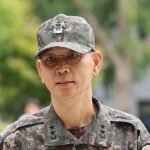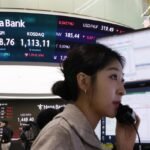A long line forms outside 7-Eleven’s pop-up store within Lotte World Tower
7-Eleven, the third-largest convenience store chain in South Korea, is challenging its bigger rivals GS25 and CU, attracting customers with Korean professional football clubs’ jerseys with uniform numbers decorated with Hello Kitty and trade cards of their players.
Last month, it opened a pop-up store within Lotte World Tower, a 123-floor skyscraper, in Jamsil, Seoul.
It displayed fancy goods such as Hello Kitty dolls in K-League uniforms and K-League mufflers featuring Kuromi, a Sanrio character in collaboration with the Japanse entertainment company. K-League stands for the Korean professional football league.
The pop-up store has drawn 250,000 visitors for three weeks. Some 600 visitors queued up every morning during the three-week period for an opening rush. It recorded the largest-ever sales for a pop-up store operated within the Lotte World Tower.
“We opened the pop-up store because of the popularity of K-League soccer cards that we have sold since last year, and it was a huge hit,” said a 7-Eleven official.
7-Eleven’s pop store within Lotte World Tower
7-Eleven has unveiled seven types of sports trade cards in collaboration with the Korea Baseball League, the Korea Volleyball Foundation and the Korea Baseball Organization, as well as with the K-League.
A pack contains cards on which professional players are depicted at random. Fans of the sports tend to buy new packs of cards until they find one printed with their favorite K-League star.
Since it released the K-league cards in September last year, it has sold 4.5 million packs of the sports cards.
The popularity of sports cards boosted sales of other products at 7-Eleven. Customers come to the store to purchase sports cards and end up buying drinks and food there.
FOOD SALES
It is also attracting budget-conscious customers with convenience food and occasional discount events for imported beer.
One of its main food products Kimbap, a Korean seaweed rice roll filled with marinated meat and various vegetables, are longer than the regular Kimba products, containing 12 pieces. A regular Kimbap contains eight pieces.
7-Eleven attracts thrify customers with affordable food boxes
7-Eleven expects it will create synergy from the merger with Ministop from the fourth quarter of this year. It completed the merger in April this year after shutting down underperforming stores and selling non-core assets.
With the addition of 2,500 Ministop stores, 7-Eleven’s outlet number rose to 13,130 stores as of the end of 2023, narrowing its gap with GS25 and CU that each runs about 17,000 stores.
7-Eleven will write off most of the goodwill it paid for the Ministop acquisition this year, so the purchase will unlikely put a dent on its earnings next year.
The 7-Eleven official said the company expects to turn to a profit in 2025.
This year, it is projected to narrow operating loss to 14.0 billion won ($10.2 million) from the 55.1 billion won shortfall in 2023 on a consolidated basis, according to Heungkuk Securities Co.
Lotte Group owns Korea Seven, the operator of 7-Eleven, including a 92.33% stake held by its holding company Lotte Corp.
By Hyun-Jin Ra
raraland@hankyung.com
Yeonhee Kim edited this article















